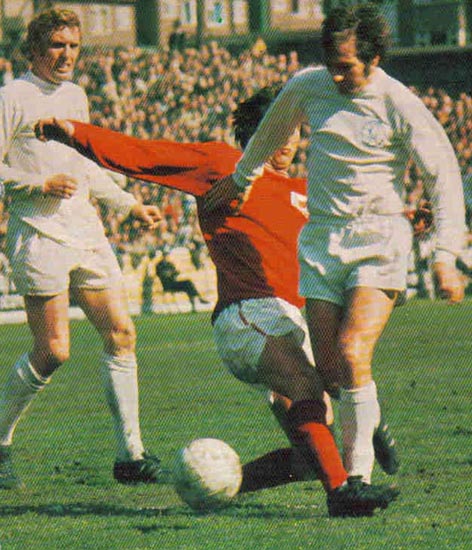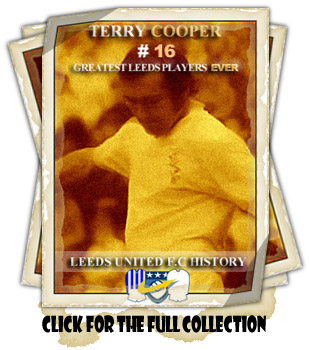

Cooper: Terence (Terry)
1961-1975
(Player Details)
Left Back
Born: Brotherton nr Castleford: 12-07-1944
Debut v Swansea Town: 11-04-1964
5’71/2” 10st 9lb (1970)
#16 in 100 Greatest LUFC Players Ever

He attended Brotherton School and played with Wath Wanderers, the Wolverhampton Wanderers
Nursery Team. He had trials with Wolves, but was playing with Ferrybridge Amateurs when he
joined Leeds as an apprentice in May 1961, turning professional in July 1962. Cooper joined
Leeds as a left-winger but despite good ball control he had insufficient speed to shrug off
the constant close attentions of defenders. He made a surprise debut on the day Leeds gained
promotion from the Second Division in 1964, but during the next four seasons, Cooper made
spasmodic first team appearances and grew increasingly frustrated with his progress. Don
Revie was about to let Cooper go to Blackburn Rovers for just £25,000. Fortunately the Ewood
club considered even that modest fee excessive. A solution was found, as Cooper took over the
left back role from Willie Bell in the 1967-68 season, and he, in that position, had the
advantage of facing play. As a defensive left-back, he had imperfections, as his lack of pace
left him vulnerable when being attacked, and it left him dependent on Norman Hunter for extra
cover. He was notably left-footed but that was less of a problem, as right-wingers tended to
play to his stronger side. Despite these flaws, within three years of becoming a regular,
Cooper was playing in the World Cup finals in Mexico and being spoken of as the best left-back
in the world. His attacking instincts never left him and his skill was always apparent along
with a shrewd football brain, with his superbly timed and struck passes down the left for Eddie
Gray a joy to behold. But Terry Cooper was never happier than when overlapping and crossing
balls into the penalty area causing panic in defences throughout the world. Unfortunately his
career saw the highs and the lows. His goals were relatively rare, but he scored against Arsenal
in the 1968 League Cup Final at Wembley to give Leeds its first major trophy. He was a vital
member of the Leeds team that won the Inter-Cities Fairs Cup in 1968, the First Division
Championship in 1968-69 and followed it up by again lifting the Inter-Cities Fairs Cup in 1971.
On 17th May 1967 he played for England against Young England at Highbury in a prelude to his
attaining his first England cap, as England were looking to replace the ageing Ray Wilson. He
made his debut in a 5-0 hammering of the French at Wembley on 12th March 1969. He was an instant
success and continued to figure prominently in home international victories over Wales in a 2-1
win at Wembley on 7th May 1969 and in the emphatic 4-1 victory over the Scots at the same venue
four days later. He did not have to wait long for his fourth Cap in a 0-0 draw against Mexico in
front of 105,000 in Mexico City on 1st June 1969, as he beat off the challenge from Emlyn Hughes
and Keith Newton for the number three jersey. On 28th July 1969, he was selected along with Jack
Charlton and Billy Bremner for the Rest of the United Kingdom against Wales at Ninian Park,
Cardiff, in a game to celebratrate the investiture of the Prince of Wales. His fifth and sixth
Caps came on 14th January 1970 in a 0-0 draw with Holland at Wembley, and on 25th February 1970
against Belgium in a 3-1 win in Brussels. He played in both games in a short tour of Central
America to acclimatize for the 1970 Mexico World Cup with games against Colombia and Ecuador, in
Bogata on 21st May 1970 and in Quito three days later. He was an ever-present for England in the
World Cup and was generally acknowledged as being the best left-back on view in the competition.
With the Group matches all being played in Guadalajara, he played in the 1-0 win over Romania on
2nd June 1970 and it was not his fault that England went down to Brazil five days later, when he
laid on a cross for Jeff Astle to make a monumental miss as incredible as the save which Gordon
Banks made from Pele. Four days later he was in the team, once more, as the ice-cool Allan Clarke
scored the England goal from the spot that saw them progress to the knock-out stage with a
victory over Czechoslovakia. He picked up his twelfth Cap as England went down to West Germany
2-3 after extra-time, after seemingly having the game won. It seemed as if Cooper would be the
England left-back for the next decade, such was his standing in the game. He continued with a 3-1
win in a friendly against East Germany at Wembley on 25th November 1970 and then in the European
Championship qualifiers and home internationals of 1971, with Malta being easily beaten 5-0 at
Wembley on 12th May 1971, Northern Ireland being beaten 1-0 in Belfast three days later, Wales
drawing 0-0 at Wembley four days after that and three days later Scotland being beaten 3-1 also at
Wembley. Cooper's eighteenth Cap came in a 3-2 win over Switzerland in Basle on 13th October 1971
in the 1972 European Cup qualifiers and he was also there for the return game at Wembley on 10th
November 1971. He broke his leg in April 1972 at the height of his powers and in his long recovery
England never adequately replaced him. The broken leg had robbed him not only of an F.A. Cup
winners medal, but of games in which to enthrall crowds when at the height of his powers. Cooper's
emergence, as much as anything, had helped Leeds to shed their image as a dour side. His recovery
had taken far longer than anticipated and Don Revie took a gamble and recalled Cooper for a 1976
European Cup qualifier against Portugal at Wembley on 20th November 1974. It sadly misfired, Cooper
was clearly lacking in fitness, pace and general sure-footedness after so long out, and the
experiment was rapidly brought to a close, as he had to limp off after only twenty-three minutes.
He never regained his peak again and March 1975 saw a move to Middlesbrough for £50,000, where
he scored once and made one hundred and five League appearances before leaving to join Bristol
City for £20,000 in July 1978. He only made eleven appearances before he crossed the city to
became Player-Coach at Bristol Rovers in August 1979. He was there almost three years and made
fifty-nine League appearances before he assisted Billy Bremner at Doncaster Rovers for a brief
spell and played twenty games for the club. In May 1982 he returned to Bristol City as
Player-Manager and also became Britain’s first Player-Director. He played a further sixty League
game, scoring once. After retiring as a player in 1984, he helped bail City out of dire financial
trouble and steered them to victory in the 1986 Freight/Rover Trophy, but his failure to push
City into the Division Three promotion frame saw him axed and replaced by his assistant Joe
Jordan in March 1988. He was appointed Exeter City Manager in May 1988 and took them to the
Fourth Division title in 1989-90. That success saw him appointed Manager of Birmingham City in
August 1991. His first season at St Andrew's saw them gain promotion from the Third Division in
1991-92 as runners-up to Brentford. He also became a Director but left in November 1993 and rejoined
Exeter City as Manager in January 1994 before he quit in June 1995 due to ill-health. He was for a time
Assistant Manager to Graeme Souness at Southampton, but is now chief scout for the club in Europe
and South America based in Tenerife. His son, Mark, overcame the bone disease osteomyelitis to be
signed by Bristol City in September 1987, he later played with Exeter City, Southend United
(on loan), Birmingham City, Fulham, Huddersfield Town (on loan), Wycombe Wanderers, Exeter City,
Hartlepool United, Macclesfield Town (on loan), Leyton Orient, Rushden & Diamonds, Hednesford Town,
Forest Green Rovers, Tamworth, Hinckley United and Kettering Town, and later Managed Tamworth and
Kettering Town.